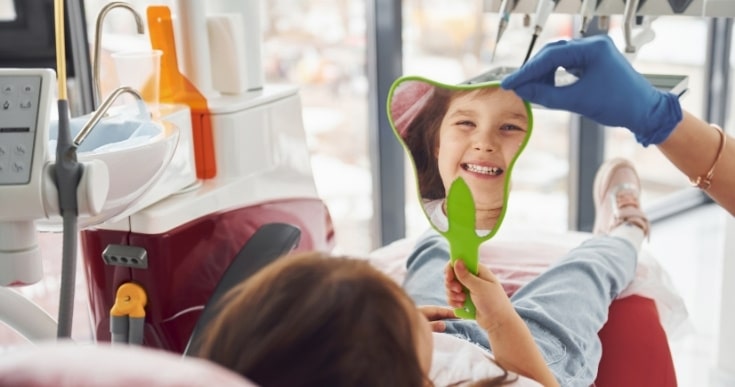
Are you worried about your child’s crooked teeth? You may think it only affects their appearance, but did you know that it can also have a significant impact on their health? From difficulty chewing to an increased risk of dental diseases, crooked teeth can cause several health problems. In this article, we’ll discuss five ways crooked teeth may affect your child’s health and why addressing them is essential for their overall well-being. So let’s dive in!
If you are concerned about the impact that crooked teeth may be having on your child’s health, please consult with a dentist or orthodontist who will be able to advise you on the best course of treatment for your child.
Health Implications of Crooked Teeth in Children
It’s no secret that crooked teeth can be a source of embarrassment for children. But did you know that they can also impact your child’s health? Here are some ways that crooked teeth may impact your child’s health:
1. Poor Oral Hygiene
One of the most common ways that crooked teeth can impact your child’s health is through poor oral hygiene. When teeth are crowded or misaligned, it can be difficult for children to brush and floss properly. This can lead to an increased risk of cavities and gum disease.
If your child has crooked teeth, be sure to help them brush and floss properly. You may also want to consider taking them to see a pediatric dentist or orthodontist for regular cleanings and checkups.
2. Difficulty Eating and Speaking Properly
It can be difficult for children with crooked teeth to eat and speak properly. This can impact their overall health in a number of ways. For instance, it can lead to problems with digestion, as food may not be properly broken down due to improper chewing. Additionally, children may suffer from malnutrition if they are unable to eat certain foods due to difficulty chewing. Finally, slurriness in speech can impede a child’s ability to communicate effectively and may lead to social isolation.
3. High Risk for Cavities/Tooth Decay
Crooked teeth are not just a cosmetic issue. They can also lead to serious health problems. Here are some ways that crooked teeth may impact your child’s health:
1. High risk for cavities and tooth decay. When teeth are crowded or misaligned, it’s harder to keep them clean. This can lead to an increased risk for cavities and tooth decay.
2. Difficulty chewing and digesting food. Crooked teeth can make it difficult for your child to chew food properly. This can lead to digestive problems and malnutrition.
3. Speech difficulties. Crooked teeth can cause your child to have difficulty speaking clearly. This can impact their ability to communicate effectively and make friends easily.
4. Increased risk of injury. Because crooked teeth stick out, they’re more likely to get chipped or broken if your child falls or is hit in the mouth.
5. Self-esteem issues. Many children feel self-conscious about their appearance when they have crooked teeth, which can impact their self-esteem and social interactions negatively
4. Increased Risk of Injury/Trauma to the Mouth
It’s no secret that crooked teeth can be a source of embarrassment for children and also increased the risk of injury/trauma to their mouth, because crooked teeth can make it difficult to bite and chew properly, your child may be more likely to bite their tongue or cheeks or suffer other mouth injuries.
5. Psychological Effects
It’s no secret that having crooked teeth can be a source of embarrassment for children. What you may not realize, however, is that Crooked teeth can also have a significant impact on your child’s psychological health. Studies have shown that children with crooked teeth are more likely to suffer from low self-esteem and poor body image. They are also more likely to avoid social interactions and feel isolated from their peers. In severe cases, children with Crooked teeth may even develop depression or anxiety. If you notice your child withdrawing from social activities or exhibiting other signs of distress, it’s important to talk to their dentist or orthodontist about treatment options. With early intervention, you can help your child avoid the negative psychological effects of Crooked teeth and ensure they enjoy a healthy, happy childhood.
How to Prevent or Address Crooked Teeth in Children
Crooked teeth are not only unsightly, but can also lead to a number of health problems for your child. Here are some ways to prevent or address crooked teeth in children:
1. Schedule regular dental checkups. This will allow your dentist to catch any problems early and recommend treatment.
2. Encourage your child to brush and floss regularly. This will help keep their teeth healthy and prevent cavities.
3. Limit sugary snacks and drinks. Too much sugar can lead to tooth decay, which can cause crooked teeth.
4. If your child does have crooked teeth, talk to your dentist about treatment options. There are many effective treatments available that can help straighten teeth and improve your child’s smile.
Conclusion
Crooked teeth can have many negative impacts on your child’s health, and it is important to be aware of these. Taking the necessary steps to address any orthodontic issues as soon as possible is integral to ensuring your child remains healthy and happy. Talking with an orthodontist about braces or Invisalign treatments will provide the best results for correcting crooked teeth and preventing complications that may arise due to misalignment. With proper planning, you can help ensure that your child has a beautiful smile while avoiding potential health risks in the future.
FAQs:
A: Crooked teeth can cause a number of different health problems for your child. They may have trouble chewing or speaking properly, and they may also be more susceptible to cavities and gum disease.
A: Some of the problems that can arise from having crooked teeth include difficulty eating, speech impediments, and an increased risk for cavities and gum disease.
A: There are a few things you can do to help your child if they have crooked teeth. You can take them to see an orthodontist to get braces, or you can try some at-home remedies like using dental tape or mouthguards.




